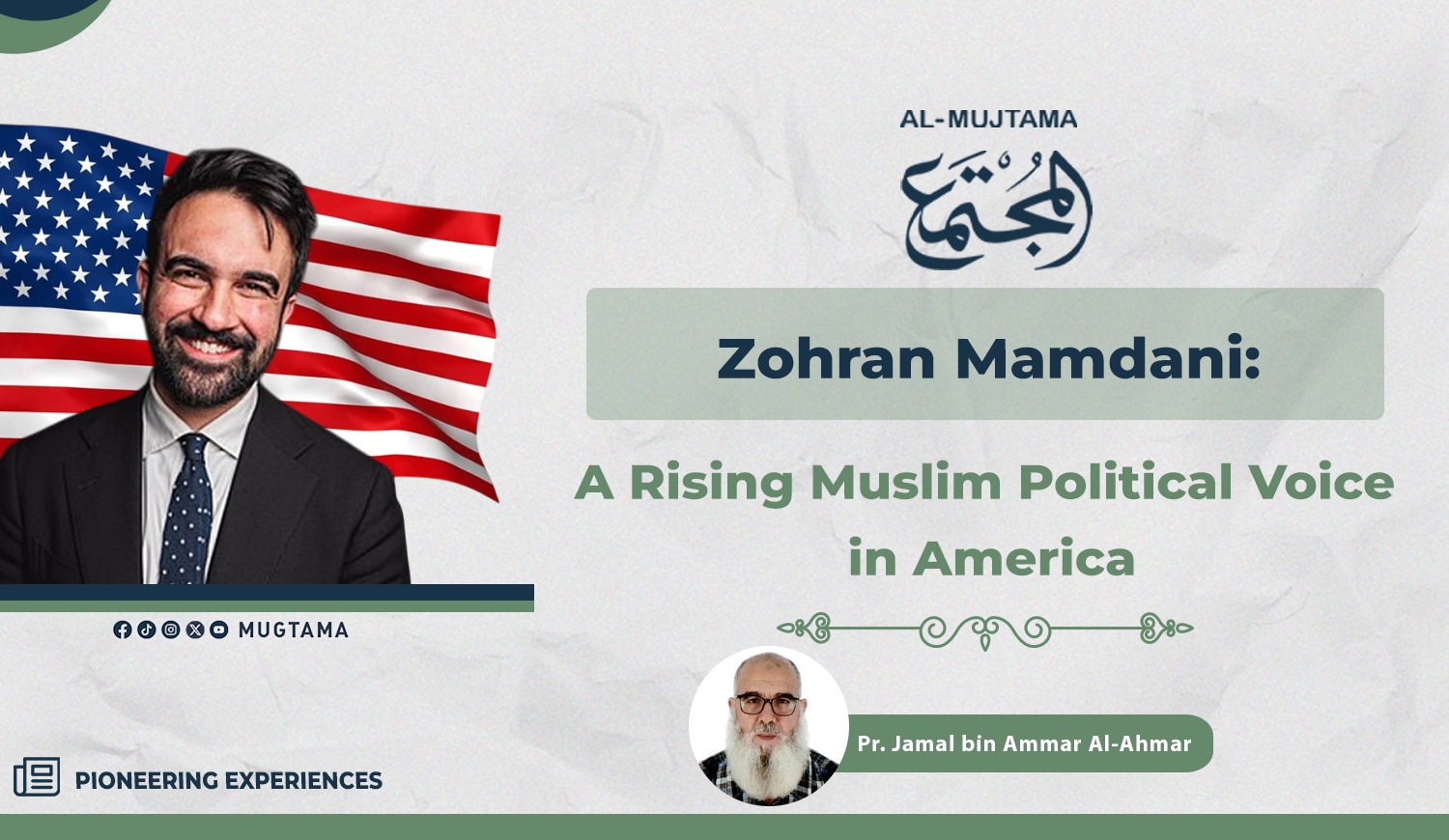Zohran Mamdani: A Rising Muslim Political Voice in America

Zohran Mamdani was born in Uganda’s
capital, Kampala, in 1991 to an educated family with roots in Yemen and South
Asia (India). His parents belong to the academic and artistic elite; his
father, Mahmood Mamdani, is a renowned historian specializing in African
studies and a professor at Columbia University. His mother, Mira Nair, is
considered one of the most prominent film directors globally. Both are
graduates of Harvard University.
At the age of seven, Mamdani moved with his
family to South Africa, and later they settled in Brooklyn, New York, where he
received his primary and secondary education. He earned a bachelor's degree in
African studies from Bowdoin College in 2014.
His wife, Rama Dawaji, is a 27-year-old
Syrian artist residing in Brooklyn. Mamdani is currently 33 years old.
Political Career
Mamdani’s professional path is notably
diverse, encompassing cinema, rap music, and writing, in addition to working as
a consultant in the public housing sector. He was also involved early on in
anti-war movements and tenants’ rights advocacy, which positioned him as a
prominent voice in left-wing social activism.
In 2017, he joined the Democratic
Socialists of America (DSA), the progressive wing of the Democratic Party that
includes influential figures such as Senator Bernie Sanders and Representative
Alexandria Ocasio-Cortez. After obtaining U.S. citizenship in 2018, he launched
his political ascent, and in 2020, he was elected to the New York State
Assembly representing District 36, which includes Astoria and Long Island City
in Queens. He held the position until 2024.
He was one of nine candidates running for
New York City mayor, and in the primaries held on Tuesday, June 24, 2025, he
achieved a significant victory by securing 43% of the vote—emerging as a
leading rising figure in the Democratic political landscape.
Islamic Identity: A
Historic Milestone in American Politics
Mamdani represents a unique precedent in
American political history as the first Muslim to run for New York City mayor.
He received broad support from leftist groups, especially the DSA, along with
notable Islamic organizations such as the Council on American-Islamic Relations
(CAIR), and a strong grassroots backing from youth activists.
He did not hesitate to make his Islamic
identity a central theme in his political discourse, frequently visiting
mosques during his campaign and stressing the importance of visible Muslim
representation in public life. At a campaign rally last spring, he stated, “We
understand that appearing publicly as Muslims also means sacrificing the safety
we enjoy in private,” in reference to the challenges Muslims face in the
political sphere.
To strengthen his social message, his
campaign engaged in symbolic initiatives that resonated widely, such as
breaking his Ramadan fast with a burrito on the subway—highlighting the issue
of food insecurity.
This public visibility was not without
risks. Mamdani reported receiving daily Islamophobic threats, some directly
targeting his family. Authorities have launched investigations into some of
these incidents as potential hate crimes.
Nevertheless, Mamdani remains one of the
most controversial figures in American urban politics, representing a unique
intersection between religious identity and political activism for social
justice causes.
Palestine: A Lifelong
Commitment to Justice
Mamdani’s pro-Palestinian activism dates
back to his time at Bowdoin College, where he co-founded the campus chapter of
Students for Justice in Palestine. He also participated in the unsuccessful
campaign of Rev. Khader El-Yateem, a Palestinian-American democratic socialist
running for New York City Council from Brooklyn.
As his political career progressed, Mamdani
emerged as one of the most vocal advocates for Palestinian rights in New York.
In 2021, he was among the few legislators
who called for halting funding to police departments that collaborate with the
Israeli military. He also took part in pro-Palestine events and voted against
legislation aimed at restricting pro-BDS speech.
Following the 2021 Gaza war, he called for
an unconditional halt to "Israeli" violence against Palestinian
civilians, asserting that justice in New York is unattainable if injustice in
Palestine is ignored.
A Remarkable Victory
in a Jewish Stronghold
During early voting between June 14–22,
2025, Mamdani scored a remarkable victory over Andrew Cuomo, the former New
York governor and member of a prominent political family who has long described
himself as a staunch supporter of “Israel.”
This win occurred in a city where Jewish
voters make up approximately 16% of the population—highlighting Mamdani’s
ability to transcend traditional political divides.
In his campaign, Mamdani announced a bold
foreign policy stance against the Zionist entity, pledging to:
- Divest New York City pension funds from companies
supporting "Israeli" settlements.
- Push for sanctions against companies like Elbit
Systems, an Israeli weapons manufacturer.
- Raise the Palestinian flag at New York City Hall
to commemorate the Nakba.
- Designate “Nakba Day” as an official city
holiday.
Radical Legislation
for Palestine and Stirring Reactions
Mamdani’s positions crossed traditional
Democratic red lines:
- He introduced a bill to revoke tax exemptions for
charitable organizations supporting “Israeli” settlements that violate
international human rights law.
- He described the Zionist entity’s policies in
Gaza as “genocide,” accused it of being an apartheid state, and called for
the arrest of its Prime Minister, Benjamin Netanyahu.
- He made electoral pledges to combat hate crimes
and increase funding for protection programs for threatened
communities—including anti-Zionist Jews.
- He declared his open support for the BDS
movement, describing it as a peaceful pressure tool.
- He vowed to arrest Netanyahu if he visited New
York, in remarks made at B’nai Jeshurun Synagogue in Manhattan.
These statements triggered a wide array of
political reactions:
- He received widespread praise and strong
grassroots support from Muslim voters, progressives, and pro-Palestine
activists. Political advisor Peter Feld commented, “Mamdani’s victory
proved that Zionist intimidation no longer works in the Democratic Party,”
even declaring, “Zionism is dead in the Democratic Party.”
- His remarks provoked intense backlash from
pro-Zionist lobbies such as AIPAC and the Anti-Defamation League (ADL),
who accused him of “anti-Semitism,” and supporting BDS.
- Media outlets pressured him to clarify his stance
on the Zionist entity’s right to exist as a Jewish state. He responded: “I’m
not comfortable supporting any state that has a hierarchy of citizenship
on the basis of religion or anything else,” affirming on The Late Show
that “Israel” has the right to exist like any other state—provided it
abides by international law.
- He was heavily criticized by former President
Donald Trump.
Future Implications
Mamdani’s win raises key questions about
the future of the Zionist lobby in America, the limits of societal acceptance
of anti-Zionist discourse, and whether this wave will extend into broader
political circles. This could potentially reshape alliances within the
Democratic Party and influence the contours of U.S. foreign policy in the
coming years.
Written by: Pr. Jamal bin Ammar Al-Ahmar
-------------------------------------------------------------
Read Also:
- Zohran Mamdani leads in fundraising for New York City mayoral contest











